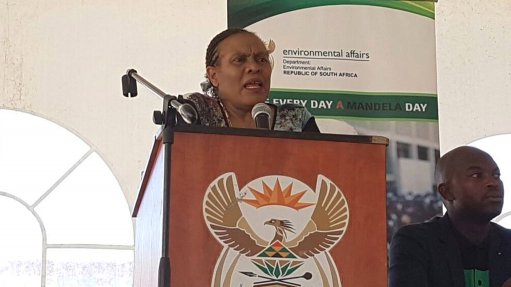
Deputy Minister of Environmental Affairs Barbara Thomson
Honourable Deputy Ministers,
MECs,
Ambassadors,
Members of Parliament,
Mayors present,
Representatives of Business,
Members of Civil Society, and
Members of the South African Negotiating Team
Ladies and Gentlemen,
I would like to extend a warm and hearty welcome to all of you to the South African Pavillion and to Fiji COP23.
Tonight we celebrate the partnership between government, business and civil society in working towards the development of a low carbon and climate resilient, future for our country.
As we begin the second, and most important week, of the international climate change talks here in Bonn, it is crucial that South Africa, as a member of the Africa Group, BASIC, the G77 and as a developing nation, we able to achieve the goals we have set ourselves. Some of these are ambitious, while others are contentious.
Ladies and Gentlemen,
The Paris Agreement is not just about climate, it is about social and developmental issues and ensuring that by the end of COP23 there is at least a draft text in place in preparation for COP24 in Poland next year 2018, in which developed nations commit to further reducing their emission gaps in the pre-2020 period, and the developing world is able to access the much-needed finance to assist with adaptation to, and mitigation of, climate change – in other words, the implementation of our Nationally Determined Contributions (NDCs).
An overriding political objective of the Bonn Climate Conference is to sustain the momentum behind the multilateral approach to addressing Climate Change with the United Nations at the forefront, given that Climate Change is a global challenge that requires that no one be left behind.
Adaptation is key in delivering basic developmental objectives. South Africa’s Greenhouse Gas (GHG) Emission reduction system framework is being implemented. Phase Two will be finalised for implementation in the post-2020 period.
The National Treasury is working on the finalisation of the Carbon Tax Legislation and the carbon offset regulations, which will also contribute to South Africa’s GreenHouse Gas Emission reduction outcome.
With regards to the Energy front, Renewable Energy Independent Power Producer Procurement Programme (REIPPPP) have been successful in contributing to the country’s emission reduction, and with the country’s significant solar and wind resources will continue to grow Renewable Energy in the energy mix.
In the past five years, the Industrial Energy Efficiency Project (IEE Project) has assisted industry to achieve energy savings worth over R1.54 billion. Phase 1 of the SA IEE Project has contributed to a reduction of Carbon emissions. These reductions were achieved across industrial sectors. This Programme has also trained 2600 more energy efficiency practitioners.
In conclusion, I would like to express the hope of the Government, and all of you present here this evening – that the Bonn Climate Talks are successful and that COP23 will lay the groundwork for a successful international climate change implementation phase to be finalised in Poland in 2018.
I thank you.